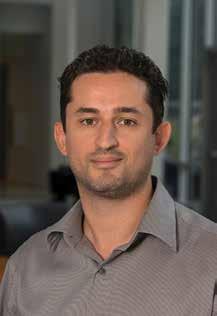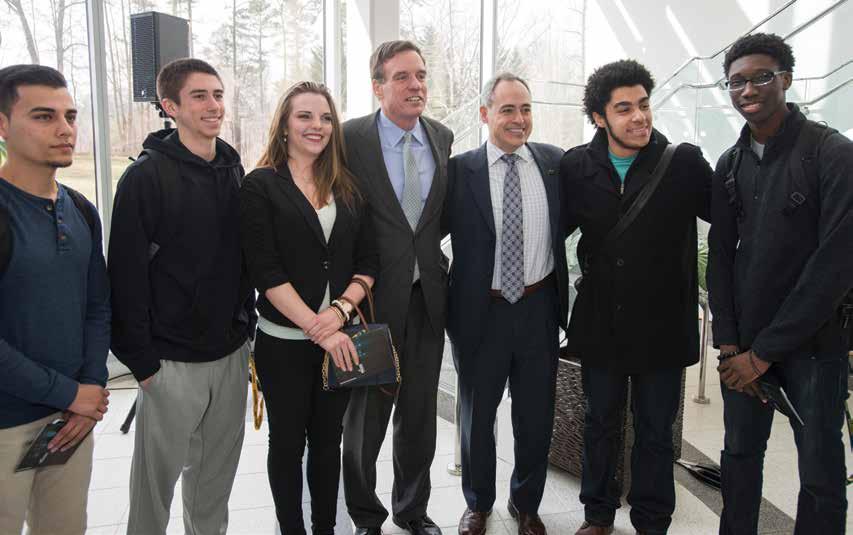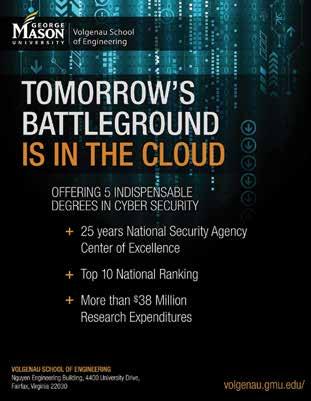
7 minute read
Cybersecurity
Protecting the information systems of a broad array of organizations and supporting the nation’s infrastructure.
MArkerS And MileStoneS
1990 Center for Secure Information Systems is established
2014 BS in Cyber Security Engineering approved by SCHEV
2015 Dean Ball signs MOA with U.S. Army Reserve for P3I funding and Mason designated as a lead partner
Cybersecurity of Physical and Information Systems
Massimiliano “Max” Albanese, assistant professor in the Department of Information Sciences and Technology, grew up in Ariano Irpino, a small town nestled in Italy’s Apennine Mountains. He received his PhD from the University of Naples Federico II, one of the oldest academic institutions in continuous operation in the world.
Albanese acquired his frst personal computer in his second year of high school, and immediately began to teach himself programing, which fueled his passion for fnding algorithmic solutions to all sorts of problems. These days he is the associate director of Mason’s Center for Secure Information Systems and is playing a major role in a $6.25 million, four-university, joint research project on “Moving Target Defense,” funded by the Army Research Ofce.
An expert in computer security, Albanese spends a good deal of his time pondering the sort of security threats the rest of us have yet to imagine. Security strategy has made seismic shifts on a regular basis since 9/11. The focus has shifted from a Cold War defense. Today concerns about a nuclear holocaust score lower on national security-threat radar than possible cyber attacks on high-level intelligence from hostile nations or terrorist groups.
A new generation of technology opened a Pandora’s Box of possible threats. Albanese explained that the ubiquitous cloud-based technology that connects everything from smartphones to aircraft changed everything. “If you are working on your own computer at home, that’s one thing, but the minute you connect to the Internet, you let in the whole world,” says Albanese.
Among other projects, Albanese’s team is currently working on research that aims to secure the

communication within and between cars, using a vehicle donated by Volkswagen. The impediments to autonomous [driverless] cars becoming a reality, explains Albanese, “are more legal than technical, and until they resolve those issues, it won’t happen.”
The average car has 40 to 60 ECU (Electronic Control Units), which means that each automobile contains a computer network with that many potential targets for hackers. So from messages that might be sent to shut down a car, for example, one can imagine the scenarios that might materialize with airliners or military vehicles, and that’s enough to keep you up at night. How do you counter these scary developments?
This is where the Moving Target Defense strategy, funded by the Army Research Ofce, comes in to provide protection from many types of cyber threats, explains Albanese.
Moving Target Defense is far more complex than sliding side-to-side in dodge ball, but the principle is the same. Since no system can remain completely impenetrable forever, the strategy is to bafe and exhaust your opponent rather than attempt to build a rock-solid electronic fortress. Moving target defense strategies can protect systems comprising hundreds upon thousands of servers and network devices.
A version of this story by Molly Brauer originally appeared on the Ofce of Research and Economic Development website.
Innovative Cyber Program Prepares Students for Crucial Careers
George Mason University’s new Bachelor of Science in Cyber Security Engineering is one more example of George Mason taking the lead, Senator Mark Warner, D-Va., said March 16 at the program’s ofcial kickof.
“If you’re in this program, you’re very smart,”Warner told students in the atrium of the Long and Kimmy Nguyen Engineering Building. “You will have careers for as long as you need them.”
Industry and the federal government are facing mission-critical skills gaps and looking to universities to fnd the solution. From power grids to banks, cybersecurity needs to be integrated during the design process, not after. Currently, cybersecurity is being shoehorned into existing systems, Warner said.
Mason’s proximity to Washington, D.C., makes it a natural center of the cybersecurity hub, said Warner, who had appointed Long Nguyen to Mason’s Board of Visitors during his governorship. Mason’s “unique and innovative approach” initially drew freshman Erika Strano to the new program this spring. Now midway through classes, she calls the decision one of her best at Mason.
“I would recommend the program to anyone who wants to be constantly learning new things throughout their career and has a passion for protecting the public through security,” Strano says.
The Volgenau School of Engineering worked with industry leaders, including Michael Papay, vice president and chief information security ofcer of Northrop Grumman Corporation, to develop the program, said Dean Ken Ball during the ribbon-cutting celebration. Karen Jackson, Virginia secretary of technology, also attended the event.
Building secure systems has moved well beyond personal computers—the country’s future is dependent on it, Papay says, noting, “George Mason gets it.”
And it’s by partnering with industry leaders that Mason helps prepare students for today’s challenges as well as tomorrow’s, said S. David Wu, Mason’s provost and executive vice president.
Cybersecurity draws upon other aspects of Mason’s expertise, including sociology and public policy, says Mason president Ángel Cabrera.
“It goes beyond technology,” he says. “That’s what makes this degree so special.” Sophomore Nadia Jehangir, who calls Texas home and is in the cybersecurity program, was drawn to Mason because of its diversity.
“I like the aspect of protecting people,” she says. “I’m excited about the opportunity that this degree ofers.”
A version of this story by Michele McDonald appeared in Mason News.

U.S. Senator Mark Warner and Mason president Ángel Cabrera pose for photos with engineering students after the Cyber Security Engineering Program ribbon cutting at the Long and Kimmy Nguyen Engineering Building on the Fairfax Campus.
Te Next Battleground Is in the Cloud:
Mason Partnership with Army Reserve Creates Pathways for Cyber Warriors
A recent Government Accounting Ofce (GAO) study identifes cybersecurity as one of six federal workforce occupations facing mission-critical skills gaps—business and industry face similar shortages.
To help bridge this gap, George Mason University's Volgenau School of Engineering is one of six top-tier universities and 12 employers partnering with the Army Reserve in a frst-of-its-kind efort to create educational pathways for future cyber warriors.
"The demand for these cybersecurity professionals and cyber-experienced soldiers far outpaces the current inventory," says Lt. Gen. Jefrey Talley, chief of the U.S. Army Reserve. "The GAO estimates that there is currently a need for 40,000 cybersecurity professionals just to satisfy the government's demand. Our belief is the [Army Reserve Cyber Private Public Partnership] efort will serve as a seed to enhance these critical eforts and lessen the skilled soldiers shortage gap."
According to Joe Martore, president and chief executive ofcer of George Mason's corporate partner CALIBRE Systems Inc., the partnership introduces a great opportunity for all the participants. "The cyber initiative identifes a mandate and a forum for universities, corporations, and the Army Reserve to make a signifcant impact in an innovative and dynamic way."
The Army Reserve is looking to build foundational programs that support U.S. soldiers and enhance their skills, education, and training to develop continuously ready cyber soldiers who can match their military and civilian careers with continuous education opportunities at top-tier regional schools.
Mason is among the universities tailoring its curriculum to address the needs of the military.
"This partnership with the Army Reserve enhances our ability to protect the nation's infrastructure and enhance the operational readiness of the Army," says Kenneth Ball, dean of the Volgenau School of Engineering.
"The goal of the P3I program is to train and educate Army Reserve soldiers to be elite cybersecurity professionals through classroom work and feld experience," says Talley. "These schools have been chosen for their excellence in cybersecurity research, teaching, and their experience in helping the public and private sectors address cybersecurity issues."
In addition to Mason, the university partners are University of Washington, Norwich University, Drexel University, University of Colorado, and University of Texas at San Antonio.
Corporate partners include Rackspace U.S. Inc., Verizon Communications Inc., Microsoft Corp., Professional Project Services Inc. (Pro2Serve), Chevron Corp., and CALIBRE Systems. The Federal Bureau of Investigation is also a partner in this efort.

A version of this story by Martha Bushong appeared in Mason News.










